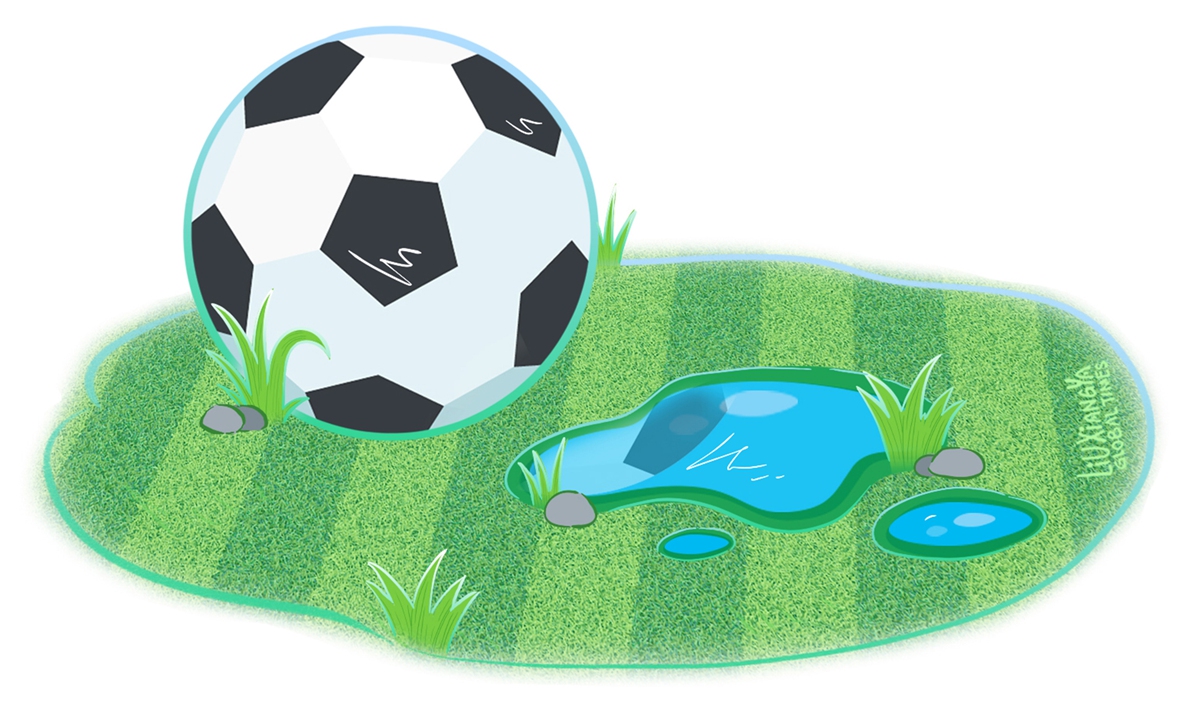
Illustration: Liu Xiangya/Global Times
Football-related corruption topics were trending on social media, as seen in the trailer for a high-profile anti-corruption documentary released Friday involving former deputy director of the General Administration of Sport Du Zhaocai , former president of the Chinese Football Association (CFA) Chen Xuyuan and former president of the Chinese Football Association (CFA). National team head coach Li Tie put the topic at the top of discussions on social media.
The Chinese national football team, present in Doha to prepare for the next Asian Cup in Qatar, will collectively watch the documentary in the middle of their intense training program, according to media reports. Such a warning has significant value and significance, as it allows all national team players as well as officials to truly recognize the responsibilities and burdens on their shoulders and recognize the importance of the issue For years.
Li, once brimming with pride when he was named head coach of the national team in January 2020, has now publicly expressed his regret, admitting he should have taken a more grounded and ethical path. Chen, who had criticized Chinese football’s excessive spending during his tenure, eventually found himself embroiled in corruption. Their fall from grace serves as a cautionary tale for the football community, prompting introspection about the sport.
As a major team ball game, football has a profound influence in China. The national team’s unique participation in the 2002 FIFA World Cup plunged the country into wild jubilation. Even though the team experienced more than two decades of underperformance, what happened to it was often subject to scrutiny.
The anti-corruption resolve has been striking, extending beyond the aforementioned trio to involve 11 other senior football officials. Football scandals have not only tarnished their legacy but also cast a shadow over the development of the sport in the country.
It is also worth mentioning that from former Shandong Taishan head coach Hao Wei to players like Jin Jingdao, Guo Tianyu and South Korean player Son Jun-ho, the current scope of investigations has spared no one . Even Xu Jiayin and Liu Yongzhuo, former managers of eight-time Chinese Super League champions Guangzhou Evergrande – known for their high spending on salaries and player transfers – are now under investigation.
China’s football industry, which witnessed a high-profile anti-corruption campaign a decade ago, is facing a harsh reality. The “golden age” of Chinese football failed to capitalize on its growth potential, but instead was steeped in corruption and embezzlement.
While current CFA President Song Kai, who took office in October 2023, emphasizes the importance of training young people, the effectiveness of these efforts could be compromised if anti-corruption measures are not fully implemented. implemented.
To achieve lasting change, it is imperative to move from simply punishing perpetrators to implementing systemic and institutionalized anti-corruption measures. This approach would not only resolve the current crisis, but also strengthen Chinese football against future corruption threats.
Systemic change involves a multifaceted approach that encompasses legal reforms, increased transparency and cultural change within the football community. Establishing a robust regulatory framework is crucial to prevent corruption from taking root again. This framework should include strict financial oversight, mandatory reporting mechanisms and thorough background checks of individuals in key roles within football organisations.
Transparency is another cornerstone of systemic change. Football clubs, associations and governing bodies must commit to open communication and disclosure of financial transactions, player transfers and sponsorship deals. Creating a culture of accountability will require a paradigm shift, encouraging stakeholders to prioritize the long-term health of Chinese football over short-term gains. Cultural change within the football community is perhaps the most difficult but essential aspect of this transformation. Instilling values of integrity, sportsmanship and fair play, from the grassroots level to the professional ranks, will reshape the mindset of players, coaches and administrators. The focus should shift from seeking immediate success at all costs to promoting a sustainable and ethical football ecosystem.
These scandals have undoubtedly tarnished the reputation of Chinese football. Restoring trust requires a concerted effort to demonstrate that sport is free from corruption and manipulation. The journey to redemption begins with a sincere apology from those involved, followed by concrete actions to right the wrongs.
The current difficulties of Chinese football represent a pivotal moment for change. To ensure lasting impact, authorities must go beyond simple punitive measures and focus on building a football ecosystem resilient to corruption. The success of these efforts will determine the future of Chinese football.
The author is a journalist at the Global Times. [email protected]

